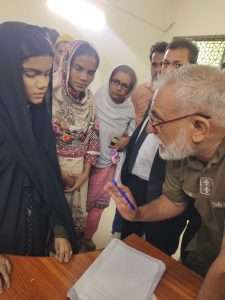In the early hours of April 30, a nightmare unfolded for the Masih family in Lahore’s Chungi Amarsidhu neighborhood. Sixteen-year-old Jessica Iqbal, a bright and innocent Catholic girl, was taken from the safety of her home by Azeem Ullah, a 32-year-old Muslim man — a neighbor, a stranger who became a predator. Her father, Iqbal Masih, still struggles to grasp how this could have happened to his beloved daughter.
“I don’t know how Azeem Ullah fooled my innocent child into going with him,” he says, his voice heavy with sorrow. “He is almost twice her age. We have no idea how long he had been grooming her. Jessica was enticed by a man she shouldn’t have ever trusted.”
The agony of that day only deepened when police released Azeem Ullah just hours after Masih filed an abduction report. “I was desperate. I begged the officers to keep him detained until Jessica was found. But instead, he vanished for three days and then returned home — free,” Masih recounts, eyes downcast.
When Jessica finally appeared before Judicial Magistrate Hassan Sarfraz Cheema on May 16, the courtroom became a stage for a cruel injustice. Despite evidence that Jessica could not recite the Kalima or answer basic questions about Islam, the magistrate accepted her statement that she had converted willingly and married Azeem Ullah by choice.
“My wife and I pleaded with Jessica to tell the truth,” Masih recalls, the pain palpable. “But she said she was helpless — that she was terrified for our lives. It was clear she was under immense pressure to say what her abductor wanted.”
The father’s anguish is immeasurable. “Our lives have been shattered. I cannot focus on anything; every moment is consumed by worry for Jessica. This mental pain is killing me slowly.”
Jessica’s story is heartbreakingly familiar in Pakistan, where countless young girls—some as young as ten—are abducted, forced to convert, and coerced into so-called “Islamic marriages.” Under threat, many give false statements supporting their kidnappers. The courts often ignore evidence of their true ages and the circumstances of their abduction, returning them to their tormentors.
Human rights advocate Sohail Habil of HARDS Pakistan, who is helping the Masih family fight this injustice, explains, “In 99 percent of cases like Jessica’s, victims are forced into false confessions because kidnappers threaten harm to them or their families. The magistrate could see the truth in Jessica’s case but still failed to act.”
Despite this, hope flickers on the horizon. Pakistan’s parliament recently passed a bill raising the legal marriage age to 18 in the federal capital territory, aiming to end child marriages and protect vulnerable children from forced conversions and marriages. Meanwhile, activists in Punjab, home to over 1.5 million Christians, await the approval of similar legislation that could save many girls from suffering Jessica’s fate.
Jessica’s ordeal is not just a story of abduction or forced conversion; it is a raw wound in the heart of a family and a stark reminder of the urgent need for justice and protection for minority girls in Pakistan.
Her father’s plea echoes silently across the nation: “Please, hear our cries. Protect our children. Stop the pain before more families like ours are broken.”
